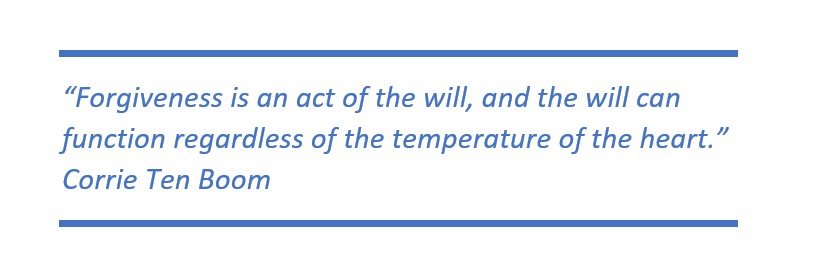There are times when forgiveness is very difficult and even seemingly impossible. The key to forgiving someone who really hurt you is to focus on the reason that we forgive, not the person who offended you or the offense. We forgive because we have been forgiven. Since our life was spared in that forgiveness, we have room for any offence.
We do not forgive someone because they deserve to be forgiven. We certainly do not forgive someone because we decided the offence was not that bad. The motivation for forgiveness is that we have been forgiven of more that we could ever be offended. We literarily owe our life to the One who tells us we must forgive others. This is seen in the bigger picture, the reason for forgiveness, the cost of unforgiveness, and the joy of forgiveness.
Look at the reason for forgiveness.
Some outsiders say Christianity is a crutch. They simply do not understand the basics of Christianity. While a non-believer can wrestle with whether or not they want to forgive someone, the believer must wrestle with how as we have no choice as the whether or not. We owe our lives to someone else and we must do hard things.
Christians do not forgive because the recipient is worthy. We have no justification for evaluating the worth of the individual. We do not forgive by pretending that an offence is not as bad as what we thought. Forgiveness is most difficult when the offences are horrific and even ongoing. The motivation for our forgiveness is that we have been forgiven of much more than what is being asked.
No matter how bad the offence is, we owe our existence and our option to forgive others to a God who loved us so much that He gave His life for us. Paul tells us, “But God shows his love for us in that while we were still sinners, Christ died for us” (Romans 5:8). James even takes it further. We define what love is altogether by his actions. “By this we know love, that he laid down his life for us, and we ought to lay down our lives for the brothers” (1 John 3:16).
He did not do this because we asked Him to or pleaded with Him. When He gave Himself for us, we were hostile to Him and wouldn’t give him the time of day. “And you, who were dead in your trespasses and the uncircumcision of your flesh, God made alive together with him, having forgiven us all our trespasses, by canceling the record of debt that stood against us with its legal demands. This he set aside, nailing it to the cross” (Colossians 2:13-14). He literally paid our debt at the cost of His son when we were standing against Him.
Christians have a rich resource to draw from as we have been ultimately forgiven. The more that we consider the rich wealth of the gift that we have been given, the easier it is to forgive anything. Let’s think about this story. I have a hundred dollars in my pocket (in fact, you gave it to me), but I took a shortcut and I was attacked by a very angry bear. It got to a point where I will certainly be killed. You risk your life to save my life. You saved me from certain death, but it cost you your own son. Now you ask me for a few dollars. “What, are you kidding me? You can have everything I have and everything I’ll ever make. You saved my life and lost your son in the process.” This is similar to what God did for us. He asks us to forgive others only after offering full and very costly forgiveness.
This cost for our forgiveness was extreme and freely given. From our perspective, our sins may be small, but the real cost of our sins is death, our death. Without forgiveness, the smallest of our sins result in real and final death. He came to pay that debt for us. “For even the Son of Man came not to be served but to serve, and to give his life as a ransom for many” (Mark 10:45).
.
Look at the Bigger Picture - Joseph and his brothers.
There is always more going on that what is right in front of you. Our story is the story that is not yet being told. There is relevant information about that happened that we do not know yet. When we look back from a larger perspective, we will see things we never dreamed of.
This is really evident in Joseph’s story. Joseph did not know when he was sold into slavery by his own brothers that there was a plan being played out. He knew that they intended to kill him and only compromised to sell him into slavery. He had no way of knowing in the moment that it was all a part of a larger plan.
However, he watched God work in his life and observed that God was accomplishing His plan through seemingly horrific circumstances. When put to the test, Joseph painted an outstanding picture for his bothers when they needed his forgiveness. After years of growing, maturing and watching, Joseph was able to see beyond his own hurts.
“But Joseph said to them, “Do not fear, for am I in the place of God? As for you, you meant evil against me, but God meant it for good, to bring it about that many people should be kept alive, as they are today. So do not fear; I will provide for you and your little ones.” Thus, he comforted them and spoke kindly to them” (Gen 50:19-21).
There are always opportunities for you to grow and gain much more than you lost. Only God can see the big picture and He is extremely investing in your growth. He watches us like good parents who will allow their children to suffer some so that they learn, but never to be destroyed. Nothing happens to any of us that God cannot use to make us stronger, more mature, and more useful.
Look at the pride of unforgiveness..
Unforgiveness seems to put us above everything especially the person that we will not forgive. We have been offended and there is a power that we hold because they need something from us. Sometimes that power is addictive. This is illustrated by Peter himself when he went to Jesus and asked, “…’Lord, how often will my brother sin against me, and I forgive him? As many as seven times?’ Jesus said to him, ‘I do not say to you seven times, but seventy times seven’” (Matthew 18:21-22). Of course, Jesus did not allow false pride.
Sometimes, when we have been offended, we want to just remove them from our lives and keep them on the outside. If we can avoid them completely, then we are not confronted with the need to forgive them. We can pretend that they do not even exist. This works fine until we remember that Jesus clearly instructed us to love one another and even called out our enemies specifically. “But I say to you, Love your enemies and pray for those who persecute you” (Matthew 5;44).
When we will not forgive, we set ourselves as judges. Our pride allows us to determine that the offense against us is not worthy to be forgiven. However, God has judged otherwise. When we do this, we find ourselves essentially saying that we know better than God what this offense cost.
When we intentionally make a wrong decision, we have to beware that we may lose the awareness to make the right decision. How does someone grow old and bitter and angry? It starts with a small reaction that is not corrected. When we settle into a given reaction, it is easier to stay in that position than it is to repent and change. Unfortunately, that easy position can lead to an ugly and dark future. Scripture warns us of what happens with pride controls us, “He who is often reproved, yet stiffens his neck, will suddenly be broken beyond healing. ” (Proverbs 21:9).
It is often our own sins that drive us to ignore God and refuse to forgive others. We cannot be convicted to look at a problem from a different angle because we are ignoring God altogether. We do not want to forgive a specific person for hurting us, so we ignore the one telling us we need to. This is very common as described in Paul’s letter to the Romans, “The wrath of God is being revealed from heaven against all the godlessness and wickedness of men who suppress the truth by their wickedness. For what may be known about God is plain to them, because God has made it plain to them” (Romans 1:19). Truth can be suppressed but it affects much more than we want it to.
Look at the cost of unforgiveness.
Unforgiveness causes us to focus on offences and robs our joy. We cannot live in joy while we are focusing on how we were offended. It is true we need to honestly see our offenses, but we also must learn to make them a part of our history and not our future.
Unforgiveness leads to resentment. Resentment steals our energy and pulls our attention and time away from living. If this is not taken care of in a reasonable amount of time, we start to expect that life has nothing more than what we are experiencing.
“Resentment is like drinking poison and then hoping it will kill your enemies.” Nelson Mandela
Unforgiveness introduces bitterness and an assortment of ugly emotions. There is no joy in bitterness. Bitterness robs us from seeing all the small things that can make a day wonderful. Bitterness steals our focus and hold it under the water so that we cannot see anything beautiful. Bitterness keeps well-adjusted people at a distance so that it can grow and take over.
Unforgiveness leads us to being unforgiven. The pride that goes behind unforgiveness is a blinding pride that keeps us from seeing our own offenses. Even when we are able to see the most egregious offences, we minimize what we have done in order to justify ourselves. The problem with pride that leads to unforgiveness is that it stands in the way of the forgiveness that we need. Jesus was very clear, “For if you forgive others their trespasses, your heavenly Father will also forgive you, but if you do not forgive others their trespasses, neither will your Father forgive your trespasses” (Matthew 6:14-15). The overwhelming criteria for being a Christian is the understanding that we need forgiveness to live and if we have been forgiven of so much then we can forgive anyone who comes our way.

Looking at the joy of forgiveness
Forgiveness is not only about
sacrifice. While it may be hard and will
be hard at times, the other side of forgiveness is a freedom that you often do
not expect. The new freedom can feel
wonderful, like someone took a giant rock out of your backpack. There is a weight that you no longer have to
carry around. It is easier to get up and
go. You can now walk longer and faster.
You can engage with everyone in so
many different ways. When you are free of the burden that you have been
carrying around, you may find that you have more freedom to smile and
laugh. You can see the absurdity in
things that you would have missed before. People treat you better because they
see you relaxed and smiling.
Giving forgiveness is a gift and
there is joy in giving. It is really
something that you have which you are giving away. There is something about giving to others
that you don’t really know until you have learned to give freely and easily.

Forgiveness also frees you up from a lot of overhead work that weighs you down and does not have much of a return. You can stop keeping score and justifying your feelings. It is important to feel the pain of an offence, but the reason for feeling it is to release it and move on. You can also release the vengeance to God. He can take care of any punishment that needs to happen, and He has all the context to judge righteously. When we let God take over that function, we free ourselves up for more healthy thoughts and meditations. That leaves us free to follow Paul’s direction, “Be kind to one another, tenderhearted, forgiving one another, as God in Christ forgave you” (Ephesians 4:23).
Forgiving others is never easy and when someone has really hurt us, it can be very difficult. However, it is an exercise that we must face and work through. When we truly know the pain and sacrifice of forgiving someone who has really hurt us, we can participate in the suffering that Jesus went through to forgive us. As with so many things in life, the most difficult sacrifices have the richest rewards.


An intriguing discussion is worth comment. I do think that you should write more on this topic, it may not be a taboo matter but generally people do not talk about such issues. To the next! Best wishes!!